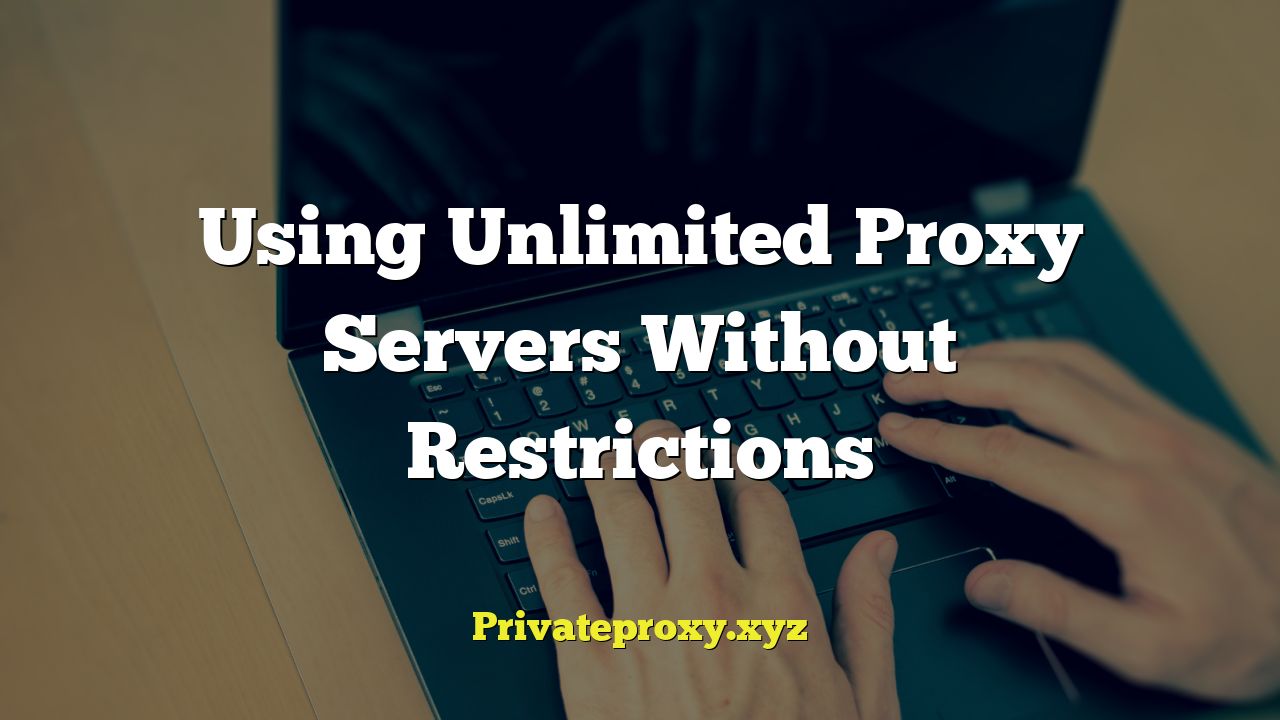
“`html
Understanding Unlimited Proxy Servers
Proxy servers act as intermediaries between your device and the internet. Instead of connecting directly to a website, your request goes through the proxy server, which then retrieves the information and sends it back to you. Unlimited proxy servers, in theory, offer unlimited bandwidth and access without usage caps. However, the reality can be more complex.
- Anonymity: Mask your IP address, making it difficult to trace your online activities back to your actual location.
- Access to Geo-Restricted Content: Bypass geographical restrictions on websites and services.
- Improved Security: Add a layer of protection against direct attacks by hiding your IP address.
- Load Balancing: Distribute network traffic across multiple servers, improving performance.
- Data Scraping: Collect data from websites without being easily blocked.
Types of Proxy Servers
Choosing the right type of proxy server is crucial for achieving the desired results. Each type offers different levels of anonymity, speed, and security.
- HTTP Proxies: Designed for web traffic. They are the most common type but offer the least security.
- HTTPS Proxies: Encrypt your web traffic, providing a more secure connection. They are ideal for accessing sensitive information.
- SOCKS Proxies: More versatile and can handle any type of traffic, including email, FTP, and torrents. They offer better anonymity than HTTP proxies.
- Rotating Proxies: Automatically change the IP address periodically, making it extremely difficult to track your online activities. These are often used for web scraping and SEO tasks.
- Dedicated Proxies: Assigned to a single user, offering faster speeds and greater reliability compared to shared proxies.
- Shared Proxies: Used by multiple users simultaneously, which can lead to slower speeds and potential IP bans.
- Residential Proxies: Use IP addresses assigned to real residential users, making them appear as legitimate traffic and reducing the risk of being blocked.
- Datacenter Proxies: Originate from data centers, which are easier to detect and block compared to residential proxies. They are often faster but less reliable for anonymity.
“Unlimited” – The Caveats
The term “unlimited” when applied to proxy servers often comes with hidden restrictions. Understanding these limitations is critical to avoid disappointment and ensure optimal performance.
- Bandwidth Throttling: While there might be no hard bandwidth cap, providers may throttle your speed if you consume excessive bandwidth.
- Usage Restrictions: Some providers restrict certain types of activities, such as torrenting or bulk emailing.
- Fair Usage Policies: Even with unlimited plans, providers may have fair usage policies that limit the amount of resources you can consume.
- Connection Limits: You may be restricted to a certain number of concurrent connections.
- Blacklisted IPs: Shared proxies may contain IP addresses that have been blacklisted by certain websites or services.
Finding Reputable Proxy Providers
Choosing a reputable proxy provider is essential for obtaining reliable and secure proxy services. Consider the following factors:
- Reviews and Reputation: Check online reviews and ratings to gauge the provider’s reputation.
- Uptime Guarantee: Look for providers that offer a high uptime guarantee, ensuring consistent access to the proxy server.
- Speed and Performance: Test the speed and performance of the proxy server before committing to a long-term subscription.
- Customer Support: Ensure the provider offers reliable customer support in case you encounter any issues.
- Pricing and Plans: Compare different pricing plans and features to find the best value for your needs.
- IP Address Pool: A larger IP address pool increases the chances of finding clean, unblocked IPs.
- Location Coverage: Choose a provider with servers located in the regions you need to access content from.
- Transparency: A transparent provider will clearly state their terms of service, usage policies, and any limitations.
Configuring and Using Proxy Servers
Configuring a proxy server depends on your operating system and the application you are using.
- Operating System Settings: You can configure proxy settings in your operating system’s network settings.
- Web Browser Settings: Most web browsers allow you to specify a proxy server for web traffic.
- Application-Specific Settings: Some applications have their own proxy settings that you need to configure.
- Proxy Management Tools: Various proxy management tools can simplify the process of configuring and managing proxy servers.
Here’s a general outline for configuring a proxy in a web browser (using Chrome as an example):
1. Open Chrome settings.
2. Search for “proxy.”
3. Open your computer’s proxy settings (this will open your operating system’s network settings).
4. Enable “Use a proxy server.”
5. Enter the proxy server address and port.
6. Save the settings.
You can find specific instructions for different browsers and operating systems online.
Avoiding Restrictions and Bans
To avoid restrictions and bans when using proxy servers, follow these best practices:
- Use Rotating Proxies: Automatically rotate your IP address to avoid being easily tracked or blocked.
- Implement Request Throttling: Limit the number of requests you send to a website within a given time period.
- Use User-Agent Rotation: Change your user-agent string to mimic different browsers and devices.
- Solve Captchas: Implement a captcha-solving service to automatically bypass captcha challenges.
- Respect Robots.txt: Adhere to the instructions in the robots.txt file to avoid crawling restricted areas of a website.
- Monitor Proxy Performance: Regularly monitor the speed and reliability of your proxy servers to identify and replace problematic ones.
- Avoid Overuse: Do not overload the proxy server with excessive requests or bandwidth consumption.
- Use Residential Proxies When Possible: These are less likely to be detected than datacenter proxies.
Use Cases for Unlimited Proxy Servers
Unlimited proxy servers are valuable in various scenarios where anonymity, security, and access to geo-restricted content are essential.
- Web Scraping: Extract data from websites for research, analysis, or competitive intelligence.
- SEO Monitoring: Track keyword rankings and analyze competitor websites without being blocked.
- Social Media Management: Manage multiple social media accounts and automate tasks without raising suspicion.
- Online Gaming: Bypass geographical restrictions and improve connection stability in online games.
- Market Research: Gather data on consumer preferences and market trends in different regions.
- Content Distribution: Distribute content to users in different geographical locations without being restricted.
- Bypassing Censorship: Access information and websites that are censored in your region.
- E-commerce: Monitor prices and availability of products on e-commerce websites.
Ethical Considerations
While using proxy servers can be beneficial, it is essential to consider the ethical implications of your activities.
- Respect Website Terms of Service: Adhere to the terms of service of the websites you are accessing.
- Avoid Illegal Activities: Do not use proxy servers for illegal activities, such as hacking or fraud.
- Do Not Disrupt Services: Avoid using proxy servers in a way that disrupts the functionality or performance of websites or services.
- Transparency: Be transparent about your use of proxy servers when interacting with websites or services.
- Data Privacy: Respect the privacy of individuals and organizations when collecting data through web scraping.
Troubleshooting Common Issues
You may encounter various issues when using proxy servers. Here are some common problems and their solutions:
- Connection Errors: Check your proxy settings and ensure the proxy server is online.
- Slow Speeds: Try using a different proxy server or upgrading to a faster plan.
- IP Bans: Rotate your IP address more frequently or use residential proxies.
- Website Blocking: Try using a different proxy server or a different type of proxy.
- Authentication Issues: Verify your proxy server username and password.
- DNS Leaks: Configure your proxy server to prevent DNS leaks.
- SSL Errors: Ensure your proxy server supports SSL encryption.
Security Best Practices
Protecting your data and privacy when using proxy servers is crucial.
- Use HTTPS Proxies: Encrypt your web traffic to protect against eavesdropping.
- Choose Reputable Providers: Select providers with strong security measures and a good reputation.
- Update Your Software: Keep your operating system and applications up to date to patch security vulnerabilities.
- Use a VPN: Combine proxy servers with a VPN for enhanced security and anonymity.
- Enable Two-Factor Authentication: Enable two-factor authentication on your accounts to protect against unauthorized access.
- Be Careful with Public Wi-Fi: Avoid using public Wi-Fi networks without a VPN or proxy server.
- Monitor Your Network Traffic: Monitor your network traffic for any suspicious activity.
The Future of Proxy Servers
The future of proxy servers is likely to be shaped by advancements in technology and changing user needs.
- Increased Demand for Residential Proxies: As websites become more sophisticated in detecting and blocking datacenter proxies, the demand for residential proxies is expected to increase.
- Integration with AI and Machine Learning: AI and machine learning algorithms will be used to optimize proxy server performance, detect and prevent abuse, and improve anonymity.
- Decentralized Proxy Networks: Decentralized proxy networks, powered by blockchain technology, will offer greater transparency, security, and resilience.
- Improved Geo-Targeting: Proxy servers will offer more granular geo-targeting capabilities, allowing users to access content from specific cities or regions.
- Enhanced Security Features: Proxy servers will incorporate more advanced security features, such as malware detection and intrusion prevention.
“`


